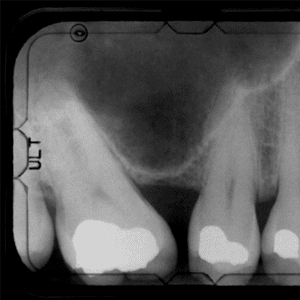Minerals and Trace Minerals: Your Key to Naturally Strong Teeth and Gums
Most patients are shocked to learn that up to 5% [...]
Most patients are shocked to learn that up to 5% [...]
Okay, so your teeth aren’t exactly falling out. But maybe they aren’t as strong as they could be, either. If you brush and floss regularly but still notice pain, sensitivity, and cavities when you go the dentist, this article is for you.
Smiles are truly amazing. The entire oral anatomy—from teeth to gums and tongue—is an instrumental part of the human experience. From forging positive first impressions to chewing delicious and nutritious foods, our teeth and gums play an integral role in the enjoyment of everyday life. Yet, there is much that goes unknown, or unappreciated, about our oral anatomy. Take a moment to review the following facts about teeth, gums, and holistic health. Then, consider how your oral health might benefit from simple changes to daily routine.
 Fresh fruits and vegetables are more than just delicious. These colorful foods are packed with the vitamins, minerals, and water our bodies need to make us look, feel, and function at our best. Health professionals have traditionally recommended eating about 2-4 servings of fruit and 7-13 servings of vegetables each day, however, that recommendation has nearly doubled in recent years. As Celiac disease and gluten sensitivity make it more difficult for an estimated 1 in 133 Americans to eat certain wheat-based foods, a growing number of individuals are compensating by eating more fruits and vegetables. Unfortunately, the use of insecticides and other genetically modified organisms (GMOs) can pose a serious threat to long term health.
Fresh fruits and vegetables are more than just delicious. These colorful foods are packed with the vitamins, minerals, and water our bodies need to make us look, feel, and function at our best. Health professionals have traditionally recommended eating about 2-4 servings of fruit and 7-13 servings of vegetables each day, however, that recommendation has nearly doubled in recent years. As Celiac disease and gluten sensitivity make it more difficult for an estimated 1 in 133 Americans to eat certain wheat-based foods, a growing number of individuals are compensating by eating more fruits and vegetables. Unfortunately, the use of insecticides and other genetically modified organisms (GMOs) can pose a serious threat to long term health.
 Research published in the January 2013 Journal of Nutritional Biochemistry explains that the major factor of obesity is not calories, but gluten. It says that weight gain from wheat consumption isn’t from the calories, but from the gluten proteins that disrupt the endocrine and exocrine systems in the body and alters metabolism causing weight gain.
Research published in the January 2013 Journal of Nutritional Biochemistry explains that the major factor of obesity is not calories, but gluten. It says that weight gain from wheat consumption isn’t from the calories, but from the gluten proteins that disrupt the endocrine and exocrine systems in the body and alters metabolism causing weight gain.
 Diet and oral health are connected in a number of interesting ways, and focusing on the former has an increasingly positive effect on the latter. Eating well sets the foundation for creating healthy teeth and gums for life, and oral health is promoted exponentially when daily food consumption is limited to the foods that are most healthy. Today, health professionals are compiling evidence that suggests food items like wheat, barley, and bread are causing serious health issues for a growing number of Americans. The evidence suggests that about 1% of the population has an adverse reaction to gluten, a protein found in most whole grains. This has prompted dental professionals to spread awareness for gluten by encouraging patients to consider how the wheat, barley, and other whole grains in their daily diet may be hurting overall health.
Diet and oral health are connected in a number of interesting ways, and focusing on the former has an increasingly positive effect on the latter. Eating well sets the foundation for creating healthy teeth and gums for life, and oral health is promoted exponentially when daily food consumption is limited to the foods that are most healthy. Today, health professionals are compiling evidence that suggests food items like wheat, barley, and bread are causing serious health issues for a growing number of Americans. The evidence suggests that about 1% of the population has an adverse reaction to gluten, a protein found in most whole grains. This has prompted dental professionals to spread awareness for gluten by encouraging patients to consider how the wheat, barley, and other whole grains in their daily diet may be hurting overall health.
 Gluten has become a buzzword in the wellness industry as an increasing number of individuals have begun to experience adverse reactions to products containing wheat, barley, rye, and other grains. Such reactions range in severity from mild discomfort in the stomach to long-term malnutrition and even osteoporosis. It is estimated that about 1% of Americans suffer from such reactions to gluten-rich foods, a number that has nearly quadrupled over the past decade. It is critical to understand the threat that gluten sensitivity may pose to overall health, and it is particularly important to understand how ordinary sensitivity is separate and distinct from Celiac Disease. The latter is an autoimmune disorder that affects about 1 in 133 Americans and, when left undiagnosed and untreated, can slowly wreak havoc on the entire body.
Gluten has become a buzzword in the wellness industry as an increasing number of individuals have begun to experience adverse reactions to products containing wheat, barley, rye, and other grains. Such reactions range in severity from mild discomfort in the stomach to long-term malnutrition and even osteoporosis. It is estimated that about 1% of Americans suffer from such reactions to gluten-rich foods, a number that has nearly quadrupled over the past decade. It is critical to understand the threat that gluten sensitivity may pose to overall health, and it is particularly important to understand how ordinary sensitivity is separate and distinct from Celiac Disease. The latter is an autoimmune disorder that affects about 1 in 133 Americans and, when left undiagnosed and untreated, can slowly wreak havoc on the entire body.
 Do you feel particularly susceptible to tooth decay? If so, you are not alone. Many Americans continually develop cavities despite feeling as though they eat well, brush thoroughly, and floss twice daily. For these individuals, tooth decay may be a sign that there is a larger underlying problem: Celiac Disease. Celiac Disease is a genetic disorder that may inhibit normal absorption of nutrients in the small intestine. Inadequate nutrient absorption may lead to several deficiencies, including weak tooth enamel.
Do you feel particularly susceptible to tooth decay? If so, you are not alone. Many Americans continually develop cavities despite feeling as though they eat well, brush thoroughly, and floss twice daily. For these individuals, tooth decay may be a sign that there is a larger underlying problem: Celiac Disease. Celiac Disease is a genetic disorder that may inhibit normal absorption of nutrients in the small intestine. Inadequate nutrient absorption may lead to several deficiencies, including weak tooth enamel.